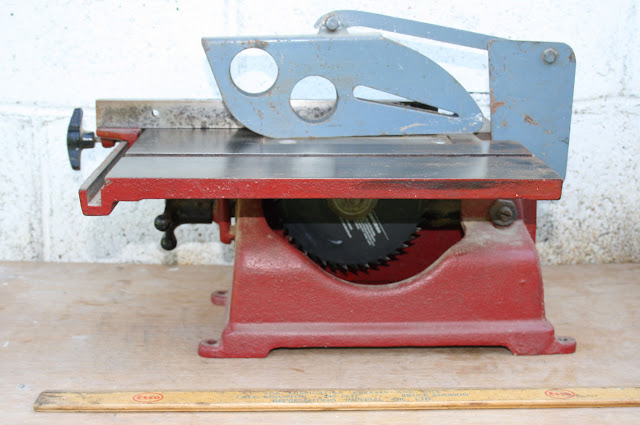Above, a lovely, tiny saw I found buried in the dump on my farm shortly after I moved here. I found the fence interred elsewhere, but never did find the mitre gauge. The tool had been in the earth for years, if not decades, but still looked worthy of restoration. I took the saw back to the shop and stripped it down, replaced the bushings and cleaned it up, and it works like new. I believe that the only repair needed was to make and braze on a new foot, since one of the four had been broken off. The guard is not original. I found it at a garage sale or thrift store and adapted it to fit. It's a testimony to the build quality that the saw could be restored after suffering such ignominious treatment.
Years later, I posted these photos on the Vintage Machinery site and last February another member kindly identified it as a product of the Arcade Manufacturing Company. Below, an ad posted on the site. It turns out I should have painted the saw grey.

The story of the Arcade Manufacturing Company goes back to 1868 when two brothers, Charles and Edward Morgan, founded the Novelty Iron Works in Chicago. By 1874, they had prospered enough to build a brand new factory on the same spot. Business then turned bad and the company failed in 1885. It was reorganized the same year by the Morgan brothers and another partner as the Arcade Manufacturing Company. Yet another new factory was constructed. The company produced a wide variety of items including hinges, screen door hinges, stove pipe dampers, lid lifters, cork extractors, corkscrews, and numerous small notions and novelties. Coffee grinders were a particular specialty of the firm. Then, in 1921, they struck a deal with the Yellow Cab Company of Chicago to produce a toy cab. Going against the received wisdom that Americans would not pay more than a dollar for a toy, the firm went on to produce a toy farm tractor, the Fordson Model F. The company's slogan for its toys was "They Look Real" and many people believed that the cast figure on the tractor seats was none other than Henry Ford himself. A whole host of miniature vehicles followed. They didn't start making home-shop tools until 1935, initially under the Arcade, Arcade Craft Tools and Craftmaster brands and, in 1941, Homecraft. In 1946 the company was acquired by the Rockwell Manufacturing Company for the sake of their foundry and machine shops. The machinery was relocated to Tupelo, Mississippi in 1952 and the company's name disappeared along with most of its products.
 |
| 1908 |





No comments:
Post a Comment